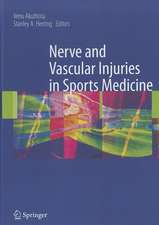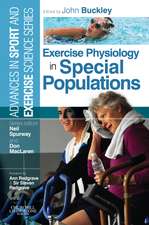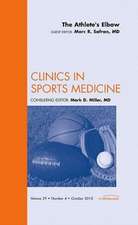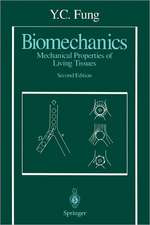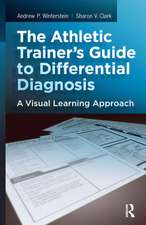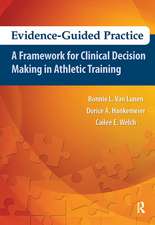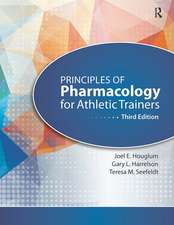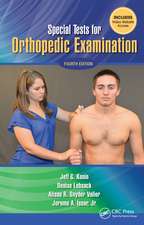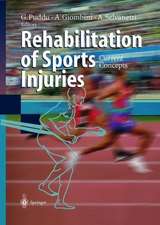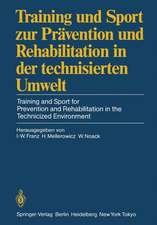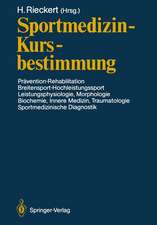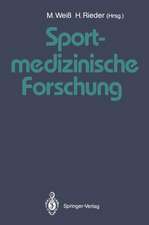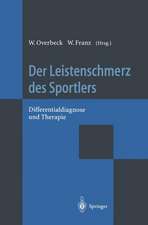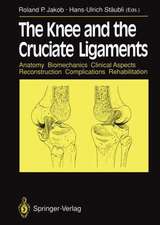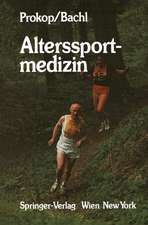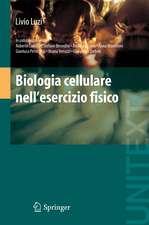Quick Questions Heat-Related Illness: Expert Advice in Sports Medicine: Quick Questions in Sports Medicine
Autor Rebecca Lopezen Limba Engleză Paperback – 15 mar 2015
Are you seeking brief, up-to-date, expert advice for common issues that can be encountered when working with athletes?
Quick Questions in Heat-Related Illness and Hydration: Expert Advice in Sports Medicine provides a unique format of concise and to-the-point responses with clinical application, backed by the latest research on heat-related illnesses and hydration issues common among athletes.
Dr. Rebecca M. Lopez and her contributors present 39 common clinical questions regarding topics such as how much and what kinds of fluids are optimal for performance and preventing illness, how to calculate an individual’s sweat rate, and the effect of supplements on hydration.
Co-published with the National Athletic Trainers’ Association, Quick Questions in Heat Related Illness and Hydration: Expert Advice in Sports Medicine provides concise answers to 39 frequently asked clinical questions. Written in a conversational tone, the authors of the individual questions represent a variety of different backgrounds and are experts in their respective field. The variety of questions and brevity of responses will make this a book that is easy to read and reference at the point of care.
Some sample sections and questions include:
- Prevention
- Is it possible to prevent death from exertional heat stroke?
- Diagnosis
- What temperature devices are valid when measuring internal body temperature in an exercising individual?
- Emergency management
- Does cold-water immersion cause shock or other adverse events?
- Environmental conditions
- What are the best methods of assessing environmental conditions and what modifications should be made to work to rest ratios, practices and games based on the environment?
- Return to play
- What is the proper functional progression for an athlete returning to play following exertional heat stroke?
- Hydration
- What are the most practical, valid methods of measuring hydration status in athletes?
Quick Questions in Heat-Related Illness and Hydration: Expert Advice in Sports Medicine is the perfect at-your-side resource for the athletic trainer, team physician, or sports medicine clinician looking for practical answers to heat-related illness and hydration questions. The concise and conversational tone allows the reader to readily apply the information into their everyday practice.
| Toate formatele și edițiile | Preț | Express |
|---|---|---|
| Paperback (1) | 435.11 lei 6-8 săpt. | |
| Taylor & Francis – 15 mar 2015 | 435.11 lei 6-8 săpt. | |
| Hardback (1) | 977.73 lei 6-8 săpt. | |
| Taylor & Francis – 4 noi 2024 | 977.73 lei 6-8 săpt. |
Preț: 435.11 lei
Preț vechi: 458.01 lei
-5% Nou
Puncte Express: 653
Preț estimativ în valută:
83.28€ • 90.50$ • 70.00£
83.28€ • 90.50$ • 70.00£
Carte tipărită la comandă
Livrare economică 19 aprilie-03 mai
Preluare comenzi: 021 569.72.76
Specificații
ISBN-13: 9781617116476
ISBN-10: 1617116475
Pagini: 248
Dimensiuni: 178 x 254 x 15 mm
Greutate: 0.5 kg
Ediția:1
Editura: Taylor & Francis
Colecția Routledge
Seria Quick Questions in Sports Medicine
Locul publicării:Oxford, United Kingdom
ISBN-10: 1617116475
Pagini: 248
Dimensiuni: 178 x 254 x 15 mm
Greutate: 0.5 kg
Ediția:1
Editura: Taylor & Francis
Colecția Routledge
Seria Quick Questions in Sports Medicine
Locul publicării:Oxford, United Kingdom
Public țintă
Professional ReferenceCuprins
Dedication Acknowledgments About the Editor Contributing Authors Preface Introduction Section I Prevention Question 1 What Are the Basic Guidelines for Preventing Exertional Heat Illnesses, Including Heat Cramps, Heat Syncope, Heat Exhaustion, and Exertional Heat Stroke? Riana R. Pryor, MS, ATC and Douglas J. Casa, PhD, ATC, FACSM, FNATA Question 2 What Factors Lead to Exertional Heat Stroke? Rebecca M. Lopez, PhD, ATC, CSCS Question 3 What Are the Physiological Benefits of Heat Acclimatization? Matthew S. Ganio, PhD Question 4 What Are the Latest Guidelines for Becoming Heat Acclimatized and Better Prepared When Exercising in a Warm Environment? Michelle A. Cleary, PhD, ATC Question 5 If an Athlete Lives in a Constantly Warm Environment (eg, Southern Parts of the United States), Is Heat Acclimatization Still an Issue in Athletic Participation? Michele C. Benz, MS, ATC, CSCS and Rebecca M. Lopez, PhD, ATC, CSCS Question 6 What Causes Heat Cramps and How Can They Be Prevented? Rebecca L. Stearns, PhD, ATC and Deanna M. Dempsey, MS Question 7 What Is the Best Way to Prevent an Athlete From Overheating When Exercising in a Hot Environment? Rebecca L. Stearns, PhD, ATC Question 8 What Impact Does Protective Equipment (ie, Helmets, Padding) Have on Heat Tolerance? Michelle A. Cleary, PhD, ATC Question 9 Should Athletes Still Take Rest Breaks Even if They Have Access to Fluids Throughout Activity? J. Luke Pryor, MS, ATC, CSCS and Riana R. Pryor, MS, ATC Question 10 Do Exertional Heat Illnesses Occur in a Continuum (ie, Heat Cramps ? Heat Exhaustion ? Exertional Heat Stroke) or Can They Occur Independently of Each Other? Rebecca M. Lopez, PhD, ATC, CSCS Question 11 Is It Possible to Prevent Death From Exertional Heat Stroke? Yuri Hosokawa, MAT, ATC, LAT and Douglas J. Casa, PhD, ATC, FACSM, FNATA Section II Diagnosis Question 12 What Criteria Are Used to Differentiate Between Heat Exhaustion and Exertional Heat Stroke? Rebecca M. Lopez, PhD, ATC, CSCS and Candi D. Ashley, PhD Question 13 What Temperature Devices Are Valid When Measuring Internal Body Temperature in an Exercising Individual? Rebecca L. Stearns, PhD, ATC and Julie K. DeMartini, PhD, ATC Question 14 Can Skin Temperature Be Used to Assess an Athlete's Body Temperature When Exercising? Luke N. Belval, ATC, CSCS and Lesley W. Vandermark, MS, ATC, PES Question 15 What Are the Steps to Correctly Use a Rectal Probe in Order to Diagnose and Monitor a Possible Case of Exertional Heat Stroke? Lesley W. Vandermark, MS, ATC, PES and William M. Adams, MS, ATC Question 16 How Does One Differentiate Between an Exertional Heat Illness and an Exertional Sickling Event? Robert C. Oh, MD, MPH and Francis G. O'Connor, MD, MPH Section III Emergency Management and Treatment Question 17 What Is the Best Practice for the Treatment of Exertional Heat Illnesses (Heat Cramps, Heat Syncope, Heat Exhaustion, and Exertional Heat Stroke)? Nicholas D. Peterkin, MD; Joseph S. Atkin, MD; and Eric E. Coris, MD Question 18 If You Do Not Have a Rectal Probe for the Proper Assessment of Body Temperature, What Should You Do if You Suspect an Athlete Has Exertional Heat Stroke? Riana R. Pryor, MS, ATC and J. Luke Pryor, MS, ATC, CSCS Question 19 How Should a Clinician Deal With a Combative Exertional Heat Stroke Victim? Douglas J. Casa, PhD, ATC, FACSM, FNATA; Luke N. Belval, ATC, CSCS; and Rebecca M. Lopez, PhD, ATC, CSCS Question 20 How Do You Prepare for and Appropriately Implement the Use of Cold-Water Immersion for the Emergency Management of Exertional Heat Stroke? William M. Adams, MS, ATC and Riana R. Pryor, MS, ATC Question 21 What Are the Proper Steps for the Treatment and Emergency Management of an Exertional Heat Stroke Victim (Including Appropriate Duration of Cooling and Transport to the Emergency Room)? Julie K. DeMartini, PhD, ATC and Robert A. Huggins, PhD, ATC, LAT Question 22 What Are the Most Effective Alternative Methods to Cooling an Exertional Heat Stroke Victim if Cold-Water Immersion Is Not Available? Julie K. DeMartini, PhD, ATC Question 23 Does Cold-Water Immersion Cause Shock or Other Adverse Events? Lindsey E. Eberman, PhD, LAT, ATC Section IV Special Considerations: Environmental Conditions and Return to Play Question 24 Can Exertional Heat Illnesses Occur in Cool or Cold Environments? Rebecca L. Stearns, PhD, ATC Question 25 What Are the Best Methods of Assessing Environmental Conditions and What Modifications Should Be Made to Work-to-Rest Ratios, Practices, and Games Based on the Environment? Earl R. Bud Cooper, EdD, ATC, CSCS Question 26 When Can an Athlete Return to Play Following an Exertional Heat Illness? Robert A. Huggins, PhD, ATC, LAT and Francis G. O'Connor, MD, MPH Question 27 What Is the Proper Functional Progression for an Athlete Returning to Play Following Exertional Heat Stroke? Brendon P. McDermott, PhD, ATC Section V Hydration Question 28 What Are the Most Practical, Valid Methods of Measuring Hydration Status in Athletes? Michelle A. Cleary, PhD, ATC Question 29 How Much and What Types of Fluid Should Be Consumed Before, During, and After Exercise or Training? Lindsey E. Eberman, PhD, LAT, ATC Question 30 How Does One Calculate Sweat Rate and Sweat Sodium Losses in an Athlete, and How Much of the Weight Loss Due to Sweating Should Be Replaced Before the Next Practice or Event? Nicole E. Moyen, MS, CSCS and Matthew S. Ganio, PhD Question 31 Is Intravenous Fluid Superior to Oral Fluid Rehydration When Replacing Fluid Losses Due to Exercise? Brendon P. McDermott, PhD, ATC Question 32 Should Sodium (via Foods, Salt Tablets, or Pickle Juice) Be Consumed Prior to or During Endurance Activities for the Prevention of Exertional Heat Illness? J. Luke Pryor, MS, ATC, CSCS and Deanna M. Dempsey, MS Question 33 How Long Should an Athletic Trainer Monitor Pre- and Post-Practice Weigh-Ins? Mike D. Ryan, PT, ATC, CES, PES Question 34 Is It Possible for an Athlete to Become Overhydrated, and Does This Help or Hinder the Athlete? Dawn M. Emerson, MS, ATC Question 35 What Is Hyponatremia, and How Can It Be Prevented, Diagnosed, and Treated? Dawn M. Emerson, MS, ATC Question 36 Is Drinking a Sports Drink More Beneficial to Drinking Water for Either Increased Performance or Preventing Exertional Heat Illness or Hyponatremia? J. D. Adams, MS and Stavros A. Kavouras, PhD, FACSM, FECSS Question 37 What Effect Does Hydration Status Have on Body Temperature During Exercise? Matthew A. Tucker, MA and Matthew S. Ganio, PhD Question 38 Do Supplements (eg, Creatine and Caffeine) Cause Dehydration or Exertional Heat Illness During Activity in Hot Environments? Candi D. Ashley, PhD Question 39 Is It Possible to Be Well Hydrated and Still Experience Exertional Heat Illness? Evan C. Johnson, PhD and Stavros A. Kavouras, PhD, FACSM, FECSS Financial Disclosures Index
Notă biografică
Rebecca M. Lopez, PhD, ATC, CSCS graduated from Florida International University in 1998 with a Bachelor’s of Science in Health Education, Athletic Training Specialization. She returned to Florida International University and obtained her Master of Science in Advanced Athletic Training/Sports Medicine in 2004. She completed her PhD in Kinesiology from the University of Connecticut in 2010. Dr. Lopez is a Board-Certified Athletic Trainer, an American College of Sports Medicine Certified Health Fitness Specialist, and a Certified Strength and Conditioning Specialist through the National Strength and Conditioning Association. She worked as a certified athletic trainer in Miami-Dade Public Schools for several years and has volunteered in the medical tent at the Boston Marathon, Marine Corps Marathon, Falmouth Road Race, and others. Her research interests include exertional heat stroke and other exertional heat illnesses, cooling methods for hyperthermic athletes, ergogenic aids and thermoregulation, sickle cell trait in athletes, hydration and exercise performance, and preventing sudden death in sports. She has published numerous peer-reviewed articles and several chapters on exertional heat illness, hydration, and preventing sudden death in sports. Dr. Lopez is currently an Assistant Professor in the Department of Orthopaedics and Sports Medicine and the Director of the Post-Professional Graduate Athletic Training Program at the University of South Florida. She also serves on the medical and science advisory board for the Korey Stringer Institute.
Descriere
Quick Questions in Heat-Related Illness and Hydration: Expert Advice in Sports Medicine provides a unique format of concise and to-the-point responses with clinical application, backed by the latest research on heat-related illnesses and hydration issues common among athletes.




